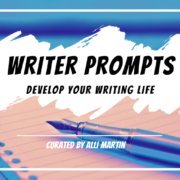The Write Life: Approaching Writing Prompts
Since I’m sharing a prompt and a response on my blog this February, I thought it was a good time to talk about how I’ve been approaching writing prompts.
I’ve written from prompts and exercises for a long time, but in the last year-plus of working on the Story Kernels podcast, I refined my approach to prompts and now have a fairly quick and painless process honed for mining inspiration from any prompt.
That’s right, I said ANY prompt!
Okay, that is a bit of a boast because, let’s face it, some prompts leave us dry, right? But I also have strategies for bringing things to a prompt to flesh it out.
Let’s get into it! (Into the prompt, I mean.)
Focus the Inspiration
Prompts come in a variety of flavors—situations and scenarios, random words, pictures, music, topical writing, and so much more. With any prompt, the first thing I do is focus on what’s hooking my attention.

Photo by Toa Heftiba on Unsplash
Sometimes that might be a single sentence in a longer prompt, or just one word from the random four I was given. The size of the “in” doesn’t matter—one moment that sparks my inspiration is all I need. That one bit will form the foundation of the idea and introduce a location, a situation, or a what-if. So long as it gives me something to build on.
From the foundation, I let my mind wander to other connections. Sometimes those connections are inspired by other elements of the prompt (pulling in a second word or another sentence or corner of a picture), but other times the connections are all from me. Robots, AI, time travel, vampires, death rites, clones, Victorians, gender nonconformity—this stuff is constantly on my mind and can be connected to any prompt foundations to spark a flame in an otherwise guttering prompt.
Who Am I Writing About?
I am a writer who needs a character. Occasionally I might start by writing about a place or the feeling of a space (if the exercise is forcing me to), but I quickly coalesce those observations into a person. I believe pretty strongly that story = character + conflict + choice, so for me to write anything—even just 100 words—I need a character.
I don’t need to know everything about the character to respond to a prompt—much of what I know about them will be discovered as I write—but I do need to have a general idea of how they feel about the situation they’re in and a name (even if it isn’t the “perfect” name).
Play Time!
Once I have that foundational idea and a character, I’m ready to play. Playing with prompts is about discovery. The more I write, the more I learn about the character and situation. I might cut in, insert a few blank lines and start a thought over. Or I might get to the end of 100 words and realize the character they’ve been talking to isn’t their friend, and I’ll go back with that new thought in mind. Nothing is set in stone and my initial time writing the prompt is all about figuring out what I want to do with it.
Most prompts are just that—play time. An opportunity to stretch my creative muscles and write without a plan. (GASP!) But sometimes—oh, sometimes—a prompt unlocks a much longer story, and I wind up using that initial piece as a starting point. Then, the play switches to planning. Which is a whole different (and much longer) blog post.
If you want to know more about approaching writing prompts, I include a brief description of where I started with each prompt posted to this blog and Patreon. Writing prompts will be posted to this blog every other month, but if you want to see them more frequently (and see more prompts), join us on Patreon. Monthly Writing Prompts are included on tiers starting at $3/month.
For full access to The Write Life and how I really feel about marketing myself, sign up on Patreon for $1 or more per month. You’ll also receive a personalized thank you in a future edition of The Write Life.



Leave a Reply
Want to join the discussion?Feel free to contribute!